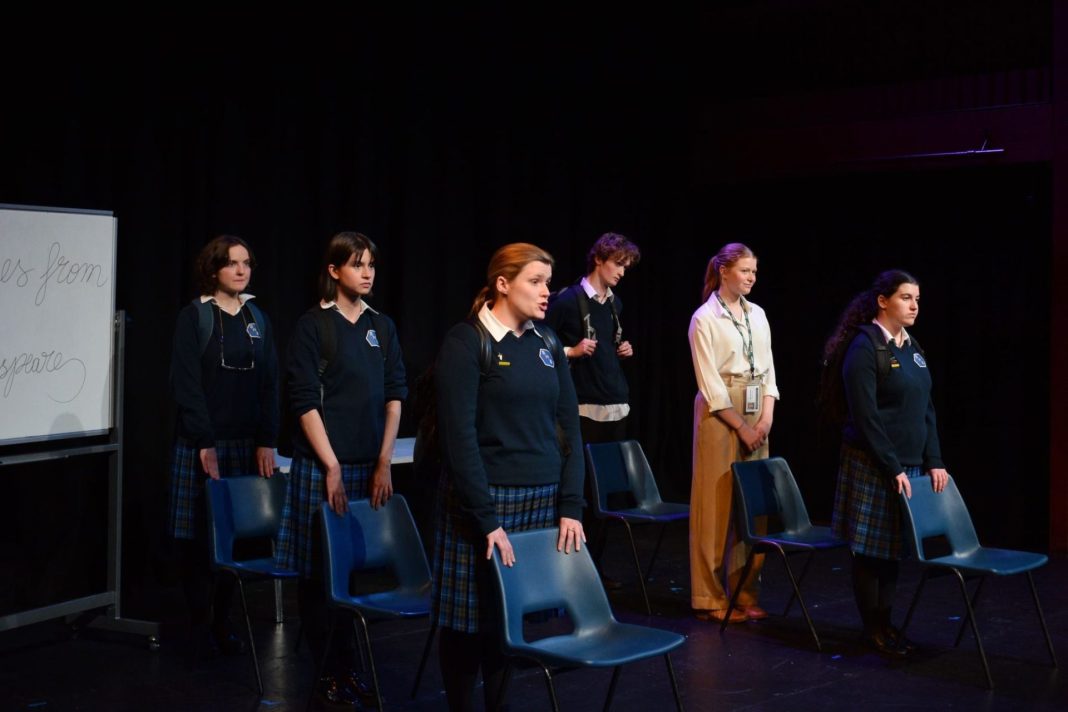Rumours of drastic script revisions and casting changes meant that I entered The North Wall (a former swimming pool, so I’ve been told), with a degree of apprehension. But in any case, the debut performance of CRUSH, written and directed by Hannah Eggleton, was well worth it, a production more polished than laborious. The result was an elevated coming-of-age story, rendered with all the trappings of the teenage experience.
The six person cast was deployed efficiently, with actors taking on multiple roles, sometimes even within the same scene. The comedic effect that comes as an almost inevitable corollary of this technique, so often a point of dramatic weakness, was embraced in CRUSH with a metatheatrical self-awareness. Such an effect complemented the extensive breaking of the fourth wall, whereby the protagonists would shift to address the audience with expository remarks, and over-the-top reactions to events onstage. The play insisted upon the melodrama of the secondary school experience, without detracting from its emotional impact.
The entire production was focalised through the perspective of Annie. Juliet Taub offered a holistic and convincing portrayal of an awkward teenager, complete with naturalistic body movement. Forever fidgeting and shuffling, her speech was inflected with the clumsy cadence of insecurity. Hannah Eggleton’s performance as Jo was a highlight; her acerbic quips, immediately deflating Annie’s romantic tendencies, made the chemistry between the two best friends veristic and compelling. Isabelle Carey-Young’s lighting, in its visual reflection of Annie’s interiority, invested the play with greater emotional depth. The lighting shifts were sharply executed, and matched Annie’s abrupt vacillation between delusion, anxiety, anger, and more, with appropriate hues. The use of sound was equally commendable, particularly the high-pitched tone that formed the sonic counterpart to Annie’s spiralling anxiety.
What stood out for me most about CRUSH was its sure-footed understanding of dramatic pacing. The narrative was taut, with a brisk run time of eighty-five minutes, steering well clear of the self-indulgent protractedness characteristic of much student drama. Shifts in tempo, although appearing initially to be counter-intuitive, were exploited to great effect. The peaks of emotional intensity were ruthlessly circumscribed, affording the audience only disparate hints at the darker undercurrent to the narrative, which was otherwise deceptively superficial. The discovery of the liaison in the chapel, for instance, was limited to an unsettling glimpse, the dim lighting an apt reflection of its swathes of indeterminacy. Such tantalising restraint, and the studied avoidance of prolixity, lent the most emotionally fraught moments even more impact. By contrast, other more quotidian occurrences like classroom scenes were drawn out, forcing the audience to experience the full excruciation of secondary-school embarrassment along with the protagonists. The pacing amplified the agony of being asked for a ‘fun fact’, for example, the melodramatic stress on minutiae mimicking teenage perceptions in a way that must have been familiar to every spectator.
The double nature of the narrative’s emotional valence, with the levity of the high-school histrionics offset by a darker, more subdued undertone, was masterfully handled in the dialogue. The over-the-top interactions in the schoolroom, replete with quips and visual comedy, stood in effective juxtaposition to the moments of greater profundity, where the blunt, naturalistic dialogue, verbally enacting Annie’s disjointed confusion, injected the scenes with an unsettling immediacy.
It cannot be said that CRUSH is achieving anything particularly ground-breaking. The coming-of-age narrative, the boarding school dynamics, the teenage stereotypes – all of these were conventional in their depictions.Yet, far from being a weakness, this turned out to be an advantage. They avoided falling into the trap of focusing on a sensationalist, avant-garde premise, liable to become mired by over-ambition and unattainable expectations, but did what they set out to do with exemplary finesse. With its combination of witty dialogue, competent production, and compelling performances, CRUSH stands as a consummate achievement, testament to the burgeoning potential of everyone involved.


